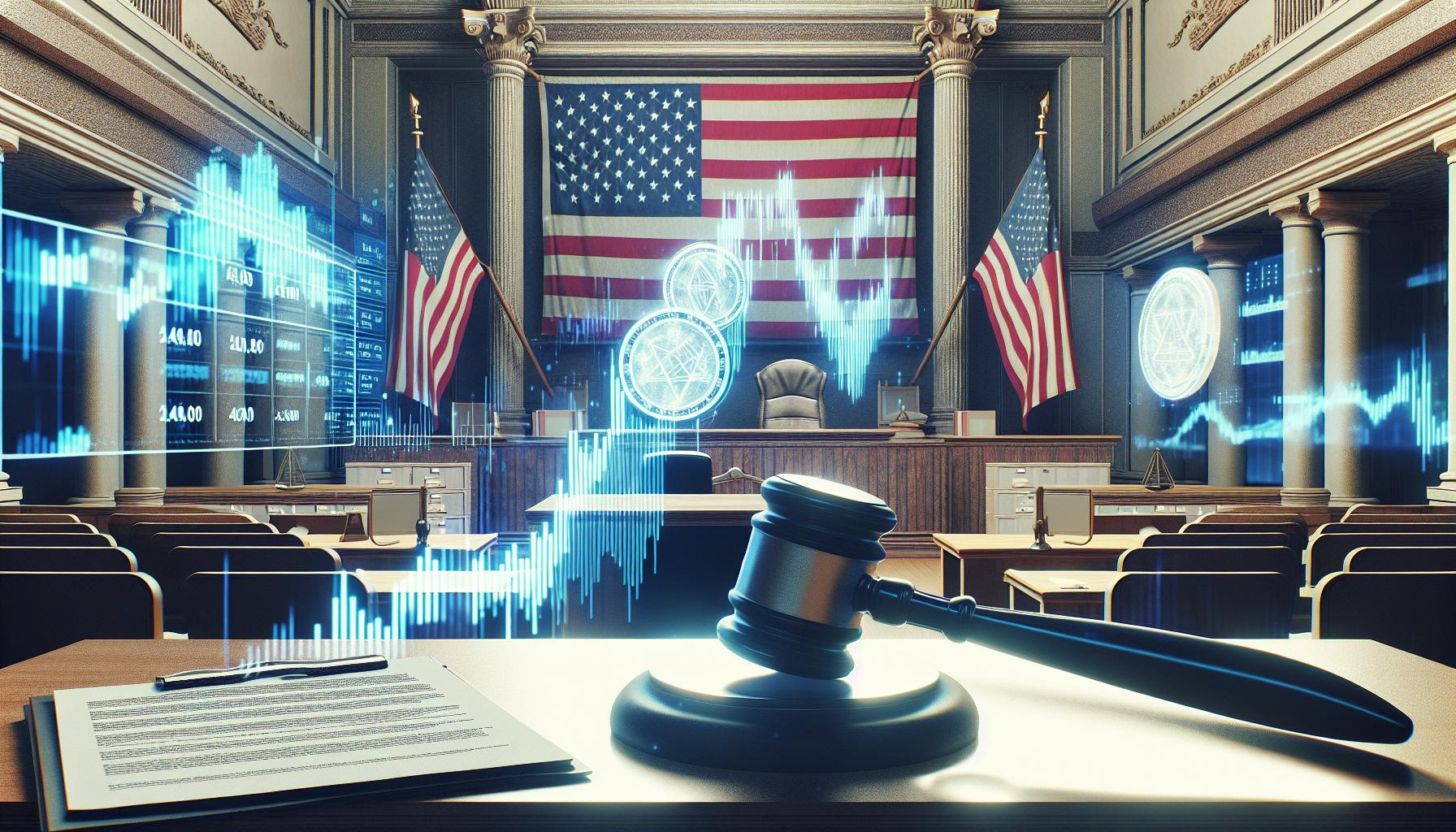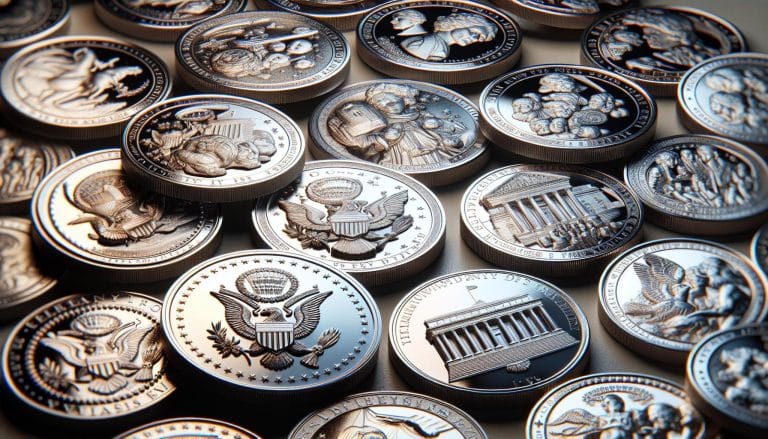SEC vs. XRP: Ripple’s Battle Shaping Global Crypto Rules
You’ve probably heard the buzz surrounding XRP and the SEC, but what’s it all about? Well, you’re about to get a closer look. We’ll delve into the latest updates, breaking down complex legal jargon into digestible insights.
The crypto world is full of twists and turns, and the XRP-SEC saga is no exception. It’s a riveting story of innovation, regulation, and the future of digital currencies. So, buckle up and get ready for a deep dive into the world of XRP and the SEC.
This article won’t just keep you informed; it’ll equip you with the knowledge to navigate the ever-evolving crypto landscape. Stay tuned and let’s embark on this exciting journey together.
Overview of XRP and Its Regulatory Journey
Let’s embark on a comprehensive exploration of XRP, beginning with its inception, followed by various regulatory milestones it has encountered.
The Beginnings of XRP
XRP sprang into existence in 2012. As a cryptocurrency developed by Ripple Labs Inc., it was designed to facilitate real-time, cross-border transactions for financial institutions. XRP serves as both a cryptocurrency and a technology protocol, with its open-source protocol known as Ripple Transaction Protocol (RTXP). In this dual role, it aids institutional transfers, reducing both time and cost compared to traditional banking methods.
Significant Regulatory Milestones
Regarding regulatory milestones, XRP faces an ongoing predicament. In December 2020, the Securities and Exchange Commission (SEC) filed a lawsuit against Ripple Labs and its executives. The SEC alleges that XRP tokens are unregistered securities and Ripple Labs has thus engaged in unlawful sales of these securities. It marks a significant point in XRP’s regulatory journey and is currently a hot topic in today’s crypto news.
Hence, XRP’s regulatory journey remains under intense scrutiny, with the outcome of the SEC lawsuit potentially reshaping the cryptocurrency’s future. As per the ‘XRP News SEC’ updates, how this case unfolds could have significant implications, determining whether XRP is a security or not, and subsequently influencing its market standing and usability.
The SEC Lawsuit Against Ripple
Jumping into the heat of the battle, let’s dissect the SEC’s allegations against Ripple, followed by the defensive stance Ripple adopted to fight it’s case.
Key Allegations by the SEC
In December 2020, the Security Exchange Commission (SEC) lodged an aggressive lawsuit against Ripple. The agency posited Ripple, along with its executives, made over $1.3 billion via an ongoing, unregistered securities offering since 2013, which violated the U.S federal securities laws. The SEC further alleged Ripple distributed billions of XRP in exchange for non-cash considerations, such as labor and market-making services. Emphasizing on the transgression, SEC alleged Ripple supported XRP’s price by fashioning a purportedly false market for the security.
To illustrate, Ripple didn’t acquire the requisite registration for their offer, nor did they qualify for a registration exemption. Ripple’s executives, Brad Garlinghouse and Chris Larsen, were consequently charged for aiding and abetting Ripple’s violations and for obtaining personal unregistered sales of XRP amounting over $600 million.
Ripple’s Defense Strategy
Ripple emphatically disagreed with SEC’s charges, contesting they’ve always functioned legally and transparently. In their sworn defense, Ripple argued, XRP was deemed as a currency and thus fell outside the purview of federal securities law. Elucidating further, they quoted the U.S Department of Justice and FinCEN, both of whom recognized XRP as a virtual currency since 2015.
Additionally, Ripple contended the SEC’s eight-year delay to enforce action against XRP crippled market participants, causing cascading commercial rupture without appropriate notice, liable to due process. They also inferred the lack of fair notice meant the SEC didn’t sufficiently caution Ripple that XRP could be treated as a security subject to regulation, thereby nullifying their violations. Evolving relevant crypto precedents, such as the SEC’s enforcement actions regarding Bitcoin and Ether, form a significant part of Ripple’s defense.
Shedding light on the XRP news SEC, every development and direction in this lawsuit is something worth keeping an eye on. As the XRP vs SEC news twist and turn with time, cogent forces are at play shaping the broader ecosystem of digital currencies.
Impact of the Lawsuit on XRP’s Market
The SEC’s lawsuit against Ripple asserts a ripple effect—pun unintended—on both the price fluctuations of XRP and on investor sentiment. Let’s unravel the repercussions it casts on XRP’s market.
XRP Price Fluctuations
XRP’s price undeniably faces the brunt of legal proceedings. Upon the SEC’s announcement of their lawsuit in December 2020, XRP prices plummeted. From a high of $0.60 in November 2020, prices fell drastically to less than $0.20 by the end of December 2020. The tables do turn post haste, though.
As of March 2022, XRP prices are on a recovery trajectory, trading above $0.80. Appended legal developments, including Ripple’s victories over the SEC in pre-trial rulings, aided this rise. Despite this, XRP’s price remains susceptible to significant volatility, mirroring the uncertainty surrounding the lawsuit’s outcome.
Here’s a snapshot of the price fluctuation:
| Month | Price |
|---|---|
| November 2020 | $0.60 |
| End of December 2020 | <$0.20 |
| March 2022 | >$0.80 |
Investor Sentiment and Market Reactions
A lawsuit as high-stakes as this one exerts a considerable influence on investor sentiment. The overwhelming uncertainty serves to deter potential investors. While post-Sec announcement, many crypto exchange platforms delisted XRP, leading to a further decline in investor confidence.
On the other hand, hardy investors withstand the turbulence, harping on the potential of Ripple’s technology and the chance for positive outcomes from the lawsuit. As XRP prices recover, and with every legal win for Ripple, investor sentiment takes an upward swing. Still, the SEC lawsuit continues to cast a long shadow over XRP’s market status.
This tug-of-war between fear and optimism molds the market reactions to the XRP news SEC. Consequently, making the market hyper-responsive to the latest xrp news updates surrounding the lawsuit—thus leaving XRP’s market in a state of delicate volatility.
Ultimately, XRP’s market dynamics proceed to fluctuate in sync with the ebb and flow of this legal tussle. Your watchful eye on the chronicle of updates in the sec xrp news could be critical for navigating these tumultuous tides.
Global Perspectives on XRP and Regulation
The perception and handling of XRP doesn’t exist in a vacuum; it varies across international borders. This section delves into how other jurisdictions view XRP and touch on future implications for international crypto markets.
Comparisons with Other Cryptocurrency Regulations
Take note, XRP’s regulatory challenges aren’t unique. Countries worldwide grapple with defining and managing cryptocurrencies. Here’s an example. In Japan, financial authorities categorize XRP as a “cryptocurrency asset”, recognizing its utility, fostering its growth, and providing legal clarity. Japan’s Financial Services Agency, the country’s regulatory body for financial institutions, declared it so following guidelines given by their Payment Services Act.
Let’s consider another instance. The U.K’s Financial Conduct Authority (FCA) draws a distinction between XRP and securities, citing its “exchange value.” The FCA in a policy statement indicated that XRP had features similar to Ethereum, which they do not classify as securities.
These regulatory variances can give XRP a breather, potentially boosting XRP’s presence and performance in countries offering a more favourable environment. Thus, XRP’s future might become a tale of two markets – restrictive or non-restrictive, significantly influenced by diverse international regulation policies.
Future Implications for International Crypto Markets
Your understanding of XRP’s ongoing battle with the SEC can’t ignore its potential global ripple effect. How this saga unfolds may shape international crypto regulations and investor confidence far beyond the U.S.
Should the SEC’s position hold sway, it might set a precedent leading to stricter global regulatory frameworks for cryptocurrencies. Countries could reevaluate their crypto rules, perhaps steering towards the SEC’s stance, affecting global crypto exchanges. Remember, the regulatory environment plays a critical role in cryptocurrency market dynamics.
But if Ripple succeeds in legally affirming XRP as a ‘currency’, cryptos worldwide could gain a significant boost. A Ripple victory might strengthen the push towards global adoption of cryptocurrency, amplifying positive investor sentiment and expanding the potential for growth in crypto markets.
Conclusion
You’ve navigated the intricate landscape of the XRP and SEC dispute. It’s clear that the case’s outcome could significantly sway global crypto regulations and investor confidence. The varying responses from different countries, like Japan and the UK, illustrate the complex and diverse nature of crypto regulation. This diversity could impact XRP’s market performance. It’s important to stay updated on these developments, as they’ll shape not only the future of XRP but potentially the entire crypto industry. Keep a close eye on this unfolding story, as it may set a precedent for how digital currencies are regulated and classified worldwide. Remember, the world of cryptocurrencies is ever-evolving, and staying informed is key to navigating it successfully.
Frequently Asked Questions
What is the legal dispute between XRP and the SEC about?
The US Securities and Exchange Commission (SEC) accuses Ripple of conducting an unregistered securities offering involving XRP. In contrast, Ripple defends it by stating that XRP is a currency and not a security, thus circumventing securities laws.
How has the SEC’s lawsuit affected XRP’s market performance?
The SEC’s lawsuit has caused notable fluctuations in the price of XRP. The XRP market reacted instantly to this legal dispute, and it’s still evident in the market’s volatility.
What are some global perspectives on XRP and its regulation?
Different countries have separate views and regulations concerning XRP. For instance, in Japan and the UK, the definitions and regulatory approaches towards XRP vary, potentially affecting its performance in those markets.
How might the SEC vs. XRp case affect international crypto regulations?
Depending on the lawsuit’s outcome, it could influence international crypto regulations, making them either stricter or more lenient. This change will impact cryptocurrency market dynamics and adoption rates globally.
How could this lawsuit impact investor confidence in cryptocurrencies?
The lawsuit’s resolution could either increase or decrease investor confidence in cryptocurrencies. Its conclusion will set a precedent for how similar issues will be treated in the future, significantly impacting investor sentiment.





